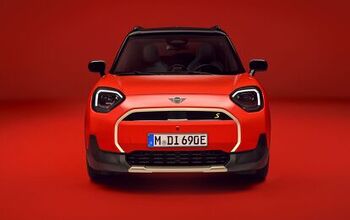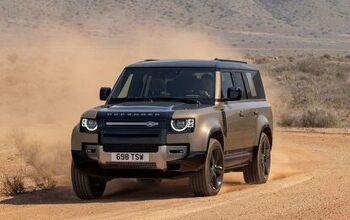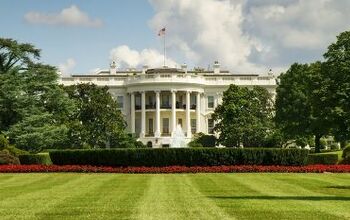It's No Wonder the Germans (and Brits) Want Electric Flagships

Stately. Elegant. Dignified. Endangered?
This isn’t the first time someone has applied that final descriptor to flagship passenger cars, and with good reason. As SUVs gobble into traditional passenger car market share, sales of even the most prestigious sedans have taken a hit — leaving premium automakers wondering “what’s next?”
Well, more SUVs, for one, but also more electrification. Luxury car buyers have shown themselves to be more receptive to plug-in hybrid or fully electric vehicles, but more importantly, one pesky American automaker — Tesla — is threatening to eat everyone’s lunch.
In Europe, competition between the Old World and Silicon Valley is heating up, and the newcomer is winning the sales race.
As reported by Automotive News Europe, Tesla’s Model S sedan finished 2017 ahead of the continent’s luxury standard bearers for the very first time. Thanks to a 30-percent sales jump, Model S sales leaped ahead of flagships from the big three premium German brands.
According to JATO Dynamics data, Tesla recorded 16,132 Model S sales in the region last year. That tops Mercedes-Benz’s S-Class, which sold 13,359 units over the same period. BMW’s 7 Series sold 11,735 examples in 2017, while Audi’s A8/S8 brought up the rear with just under 6,000 deliveries.
Sales of alternative-fueled vehicles (hybrids, plug-ins and electrics) rose 46.2 percent in Europe last year, with 738,000 registrations.
It was one thing for Tesla to top sales charts in Norway, but now it’s marching into Teutonic territory and seizing it for itself. The ever-more-stringent emissions standards and proposed diesel or internal combustion bans in various European jurisdictions fails to paint a pretty picture for these flagships’ future.
While it’s a sole model battling automakers with vast stables of SUVs, the Tesla Model X SUV has already matched or outsold popular ICE-powered SUVs in the region, as well. Include the Porsche Cayenne and BMW X6 among those challengers.
Desperate times call for what?
While both Mercedes-Benz and BMW already field plug-in hybrid variants of the S-Class and 7 Series, those models alone won’t be enough to fend off Tesla, especially once it maxes out production at its Fremont, California assembly plant. Never mind once a proposed European factory opens.
The plan is to beat Tesla at its own game.
M-B plans to offer fully electric vehicles in just a couple years’ time, and there’ll be at least one SUV among the EQ-branded EVs. Bimmer plans to offer up to 25 electric or hybrid vehicles by 2025 under its “i” sub-brand. There’s also flexible platforms on the way for the coming decade, capable of handling all powertrain types, and an EV in the four-door “gran coupe” style coming in 2021.
Over at Jaguar, top brass reportedly feel the only way to keep the classic XJ model in production is by stripping it of an engine and gas tank. Audi knows brand die-hards love a nice V8, but it won’t sit on its laurels as customers increasingly turn towards green options. There’s three EVs coming by 2020.
It’s a game of technological catch-up for these storied brands, but, as Tesla has demonstrated with its Model 3 assembly issues, the old guard’s cash and production capacity might help it win the race.
[Image: Daimler AG]

More by Steph Willems
Latest Car Reviews
Read moreLatest Product Reviews
Read moreRecent Comments
- Master Baiter Toyota and Honda have sufficient brand equity and manufacturing expertise that they could switch to producing EVs if and when they determine it's necessary based on market realities. If you know how to build cars, then designing one around an EV drive train is trivial for a company the size of Toyota or Honda. By waiting it out, these companies can take advantage of supply chains being developed around batteries and electric motors, while avoiding short term losses like Ford is experiencing. Regarding hybrids, personally I don't do enough city driving to warrant the expense and complexity of a system essentially designed to recover braking energy.
- Urlik You missed the point. The Feds haven’t changed child labor laws so it is still illegal under Federal law. No state has changed their law so that it goes against a Federal child labor hazardous order like working in a slaughter house either.
- Plaincraig 1975 Mercury Cougar with the 460 four barrel. My dad bought it new and removed all the pollution control stuff and did a lot of upgrades to the engine (450hp). I got to use it from 1986 to 1991 when I got my Eclipse GSX. The payments and insurance for a 3000GT were going to be too much. No tickets no accidents so far in my many years and miles.My sister learned on a 76 LTD with the 350 two barrel then a Ford Escort but she has tickets (speeding but she has contacts so they get dismissed or fine and no points) and accidents (none her fault)
- Namesakeone If I were the parent of a teenage daughter, I would want her in an H1 Hummer. It would be big enough to protect her in a crash, too big for her to afford the fuel (and thus keep her home), big enough to intimidate her in a parallel-parking situation (and thus keep her home), and the transmission tunnel would prevent backseat sex.If I were the parent of a teenage son, I would want him to have, for his first wheeled transportation...a ride-on lawnmower. For obvious reasons.
- ToolGuy If I were a teen under the tutelage of one of the B&B, I think it would make perfect sense to jump straight into one of those "forever cars"... see then I could drive it forever and not have to worry about ever replacing it. This plan seems flawless, doesn't it?


































Comments
Join the conversation
The coming years will be interesting to watch. Looking forward to it.
Talk, talk, talk from the established automakers. Everything and the moon is coming in 2020. No, make that 2025. Oh, did we say “electric”? We meant 48-Volt stop-start systems.